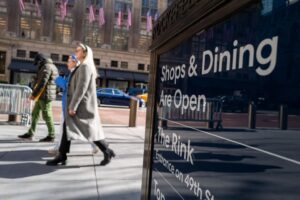Consumer confidence is up, business sentiment is down, and recession fears linger. The health of the US economy is indeed challenging to gauge. At first glance, the country is on the brink of a financial meltdown: rampant price inflation, slowing economic conditions, soaring public and private debt levels, and a banking crisis. Yet various metrics and surveys suggest that the state of the union is humming along. Will the United States avert a downturn, or will the bell toll on the world’s largest economy?
Consumer Confidence Strengthens
The widely watched Conference Board’s Consumer Confidence Index (CCI) rose to 104.2 in March, up from 103.4 in February. Conversely, the Present Situation Index – a measurement of how consumers feel about current business and labor conditions – slipped from 153.0 to 151.1 last month, while the Expectations Index advanced from 70.4 to 73.0. If the outlook component of the CCI is below 80, it typically signals a recession within the following year.
On the pricing front, CB’s one-year inflation expectations rose to 6.3% after sliding in February.
“While consumers feel a bit more confident about what’s ahead, they are slightly less optimistic about the current landscape. The share of consumers saying jobs are ‘plentiful’ fell, while the share of those saying jobs are ‘not so plentiful’ rose,” said Ataman Ozyildirim, the Senior Director of Economics at The Conference Board, in a statement. “The latest results also reveal that their expectations of inflation over the next 12 months remains elevated—at 6.3 percent. Overall purchasing plans for appliances continued to soften while automobile purchases saw a slight increase.”
What makes these findings more fascinating is that the cut-off date for the survey was ten dates after the Silicon Valley Bank and Signature Bank failures, so the crisis was already taken into account. But are businesses showing the same upward trend on the optimism scale?
Business Sentiment Weakens
Many industry reports surveying businesses show that companies are not too optimistic about the present or the future. The monthly Business Confidence Index (BCI) from Statista Research Department came in at 99.06, continuing the downward pattern since – you guessed it – President Joe Biden came into office. The CEIC Business Confidence Change fell by 21.4% in February, slightly up from the 20.4% drop at the same time a year ago. In addition, the regional central bank surveys highlight sour business sentiment in several pockets of the nation.
In the last week, the Richmond Fed Bank’s Manufacturing and Services Indexes clocked in at -5 and 17. The Dallas Fed Bank’s Manufacturing and Services Indexes posted readings of -15.7 and -18. The Philly Fed Manufacturing Index remained in contraction territory at -23.2. The Chicago Fed National Activity Index weakened to -0.19. The only positive print was the Kansas Fed Manufacturing Index: +3.
Some of the comments in these surveys reveal the same theme across the business landscape: Inflation is still a challenge, finding labor is an issue, business is slowing down, and the outlook is uncertain.

(Photo by Spencer Platt/Getty Images)
“There are too many negatives in the economy,” said one Texas executive in the transportation equipment manufacturing business. “International conflict, inflation, poor national leadership, deficit spending, the Federal Reserve keeping rates artificially low and now raising them quickly and steeply, thus stressing the financial markets.”
The Philly Fed survey among manufacturing leaders listed supply chains, labor supply, and financial capital as the leading constraints on capacity utilization.
Fed Chair Jerome Powell warned in his post-Federal Open Market Committee (FOMC) meeting press conference that the fallout of Silicon Valley Bank and Signature would result in tighter credit conditions. Therefore, the upcoming business and consumer surveys should be telling if the banking crisis will weigh on the broader economy and potentially usher in a recession.
What About That Recession?
The latest Atlanta Fed Bank GDPNow model estimate suggests the US economy expanded by 3.2% in the first quarter. The Philadelphia Fed Bank’s Survey of Professional Forecasts has the January-March GDP growth rate at 0.7%. Some of the latest numbers confirm that the nation may have avoided a recession to kick off 2023. But economists and market analysts, who had already penciled in a downturn for later this year, bolstered their odds for a period of economic contraction following the bank failures. Even Minneapolis Fed Bank President Neel Kashkari told CBS’ Face the Nation that the latest banking turmoil is bringing the nation closer to a recession.
But while the Ivory Tower class can discuss the intricacies of PMIs and services inflation excluding housing, the American people are in rough shape, as half the population is living paycheck to paycheck. Perhaps the famous Howard Beale speech from Network could describe today’s climate:
“I don’t have to tell you things are bad. Everybody knows things are bad. It’s a depression. Everybody’s out of work or scared of losing their job. The dollar buys a nickel’s worth. Banks are going bust. Shopkeepers keep a gun under the counter. Punks are running wild in the street, and there’s nobody anywhere who seems to know what to do, and there’s no end to it. We know the air is unfit to breathe and our food is unfit to eat, and we sit watching our TVs while some local newscaster tells us that today we had fifteen homicides and sixty-three violent crimes, as if that’s the way it’s supposed to be.”
All opinions expressed are those of the author and do not necessarily represent those of Liberty Nation.
Do you have an opinion about this article? We’d love to hear it! If you send your comments to [email protected], we might even publish your edited remarks in our new feature, LN Readers Speak Out. Remember to include the title of the article along with your name, city, and state.
Please respect our republishing guidelines. Republication permission does not equal site endorsement. Click here.

